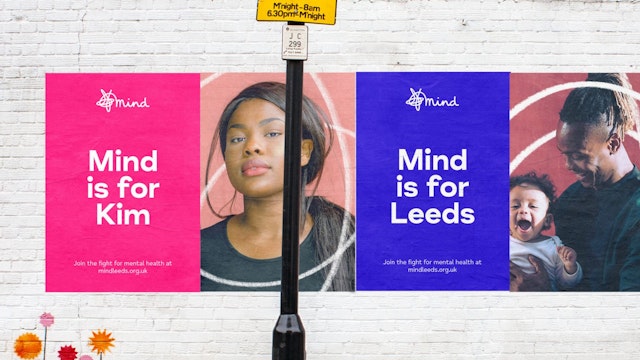How Mind is rethinking brand strategy after pandemic’s mental health toll
Founded in 1946, Mind is among the UK’s foremost mental health charities. After two years of supporting people through the Covid-19 pandemic, it has emerged on the other side with a fresh brand strategy and a newly-appointed creative agency in Publicis’s Langland. We sat down with Jennifer Walters, the organization’s associate director of external relations, to discuss the brand’s roadmap for addressing the UK’s mental health crisis in the coming years.

Mind is overhauling its brand identity and strategy amid a crisis of mental health / Image via Mind and DesignStudio
Over the last decade, public awareness campaigns and the impact of the pandemic have resulted in a seismic shift in attitudes toward mental health, but Jennifer Walters, associate director of external relations at Mind, says the former brand identity and strategy just wasn’t up to the challenge.
Several years ago, the Mind model was “disparate,” she says. “The brand identity, for better mental health, was one we had had for a while, and because we are a federated model with over 150 branches across England and Wales – each with their own board of trustees – our approach perhaps lacked a little discipline.
“Our strategy for better mental health served us well for many years, but at the onset of the pandemic we realized we needed to think about presenting our strategy more boldly.”
Accordingly, Mind released its new brand identity ‘We Are Mind’ in the summer of last year, including a logo and branding refresh by DesignStudio, alongside a strategic overhaul.

Directed by a steering group made up of people with lived experiences of poor mental health and accessing mental health services, Walters says the brand’s overhaul will focus on “support through a proactive campaigning voice, rather than a passive one.”
A crucial aspect of this new engagement strategy has been targeting the groups within which poor mental health is most prominent – young people, people in poverty and people of color. “And of course, much of the time, people can be in all three of those groups.”
She explains that the new branding emphasizes flexibility, in keeping with Mind’s cross-platform campaigning that aims to keep mental health and wellbeing at the forefront of people’s minds, with corporate partners and sponsorships forming a crucial part of this.
Its largest project has been Time to Talk day, a nationwide event run in partnership with Co-op, that aims to create supportive communities by encouraging people to talk to their friends, families and colleagues about mental health. “And we have seen great results.”
“Mental health is now in the top five favorite social causes among the general population in the UK, and as a brand that growth has been coming since 2014. Our spontaneous awareness has also grown from 8% to 12% and, in comparison to some other big charities, our property awareness has also grown from 66% to 76%.”
Furthermore, while most charities often find they receive the most engagement from people with lived experience of the cause, Walters says Mind is unusual in that it is seeing increased engagement from people who haven’t had a direct experience but still relate to the cause.
“What we’re seeing is real resonance and with that the very real possibility of getting engagement from a significant proportion of the population.”
Tackling poor mental health faces significant challenges going forward as Walters says Mind is seeing a doubling down in certain groups – particularly young people – experiencing poor mental health. “They are significant numbers – in some areas we are talking about a crisis in mental health,” she says. “Waiting lists for NHS care are off the scale, as is the waiting list for Child and Adolescent Mental Health Services (CAHMS).”
In an increasingly difficult economic environment, Walters says Mind will be focusing on raising awareness of its own support network and signposting where people can go to access support for their mental health – messaging which forms the foundation of its upcoming campaign, created in partnership with newly-appointed creative agency Publicis’s Langland.
“We know that mental health can be complex, and hearing about extensive waiting times and difficulties accessing support will be disheartening. For people who are concerned about heating their homes and feeding their children amid the rising cost of living, it’s more important than ever that people know Mind is here for them and can help you access information and support.
“We are the front door,” she says.
Walters concludes that Mind is deeply concerned about the impact of the cost of living crisis on those within Mind’s earmarked vulnerable groups, which is why they will be the target audience for the charity’s upcoming campaign.
“For people experiencing deprivation we want to push the message that their mental health should be a priority. So through paid advertising, we’re going to be addressing a slightly younger audience than we have before, in an attempt to shift the relatability of Mind as a brand to those groups.”
Walters also teases a cross-platform campaign that will include out-of-home (OOH), as well as broadcast and digital. “You’ll be seeing a much more consistent message around Mind in this campaign, across multiple touchpoints.”
The message will be simple: “Whatever information about mental health you need, Mind will either give it to you, or show you where you can get it. It’s assertive, but I’m a simple creature. I think the simpler the message, the more powerful it will be.”

